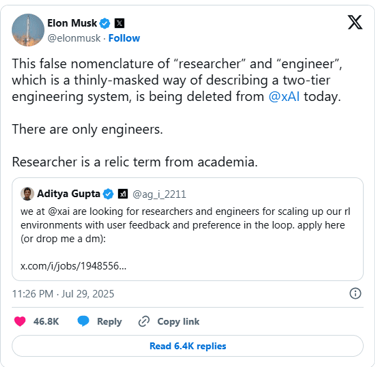Elon Musk Rebrands Researchers at XAI to Engineers
Elon Musk has announced the end of the term 'researcher' at XAI, deeming it outdated. All team members will now hold the title of 'engineers' to enhance accountability and focus on results. Discover how this change reflects Musk's vision for innovation.
TECHNOLOGY


🧠 Introduction: Elon Musk Sparks a Cultural Shift at xAI
Elon Musk has once again made headlines by challenging conventional norms. This time, he’s reshaping the internal job structure at his AI startup, xAI. The move? Completely eliminating the title “researcher” and replacing it with “engineer” across the board.
This decision marks a radical shift in AI workplace culture, rejecting the traditional academic influence that many AI labs still operate under.
📍 What Happened?
It all started with a job post by xAI employee Aditya Gupta, who was looking for an:
“AI Engineer and Researcher – Reasoning Post Training”
The role focused on advanced AI techniques like reinforcement learning with human feedback (RLHF). However, Musk quickly responded with a correction:
💬 Elon Musk's Response:
“This false nomenclature of 'researcher' and 'engineer', which is a thinly-masked way of describing a two-tier engineering system, is being deleted from xAI today… There are only engineers. 'Researcher' is a relic term from academia.”
Soon after, the post was edited to remove the word “researcher,” stating instead:
“Correction: looking for solid engineers.”
🛠 Why Elon Musk Dislikes the Term "Researcher"
Musk’s argument is rooted in two main ideas:
1. Avoiding Two-Tier Systems
Using separate titles like “researcher” and “engineer” creates unnecessary status hierarchies.
Musk wants a flat organizational structure, where all contributors are treated equally.
2. Encouraging Accountability
Musk sees “researcher” as a low-accountability, academic holdover.
He believes that results—not titles or theoretical work—should define value.
🚀 SpaceX as a Model for xAI
To back up his philosophy, Musk pointed to SpaceX, another of his companies known for engineering excellence:
“SpaceX does more meaningful, cutting-edge ‘research’ on rockets and satellites than all the academic university labs on Earth combined… but we don’t use the pretentious, low-accountability term ‘researcher’. We say engineer.”
Key Takeaway:
Even at the cutting edge of aerospace innovation, Musk insists on the engineer title.
He prefers hands-on problem-solving over theoretical work with no real-world application.
🧪 Research vs Engineering in AI: A Cultural Divide
Here’s how traditional AI companies differ from Musk’s vision at xAI:
Traditional AI LabsMusk’s xAI ApproachResearchers & EngineersEngineers onlyEmphasis on publishingEmphasis on buildingAcademic titles matterTitles mean lessTheory-drivenApplication-driven
🚫 Musk’s View:
"Researcher" = prestige without responsibility
"Engineer" = accountability, output, and real impact
🔄 How This Impacts AI Hiring
For job seekers, Musk’s decision has serious implications:
✅ Ideal for:
Engineers who like shipping products
AI specialists who prefer hands-on work over papers
People who value speed, results, and flat teams
❌ May deter:
Academics and PhDs who value publishing
Those looking for long-term theoretical research roles
Professionals who see “researcher” as a badge of honor
💬 Reactions from the Industry
👍 Supporters Say:
It's a refreshing take that brings focus back to output
Encourages a team culture, not silos
Engineers and researchers often do overlapping work anyway
👎 Critics Say:
It undermines theoretical innovation
Risks losing talent who prefer structured research environments
Not all research is “low-accountability”—some is essential for future breakthroughs
🔚 Conclusion: A Bold (and Divisive) Move
Elon Musk’s “engineers only” declaration at xAI isn’t just a linguistic change—it reflects a philosophical and structural overhaul. By erasing the title of “researcher,” Musk is advocating for:
Flat hierarchies
High accountability
A culture of building, not just theorizing
Love him or hate him, Musk’s boldness is pushing the boundaries of how tech companies operate—and how AI talent is recognized.
💭 What Do You Think?
Is this a smart move to break down barriers and foster innovation—or does it undervalue the essential role of academic-style research in AI?
Tell us in the comments.
